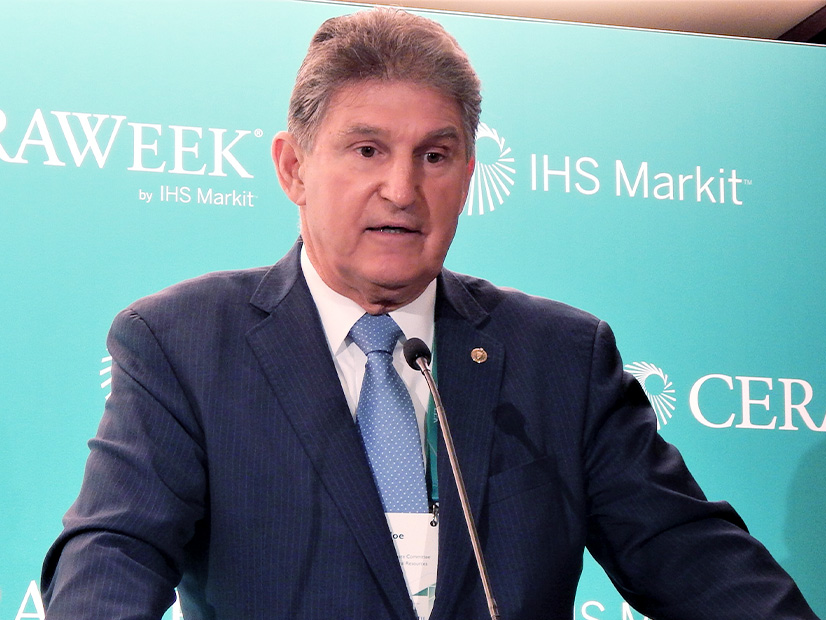Sens. Joe Manchin (I-W.Va.) and John Barrasso (R-Wyo.) on July 22 introduced long-planned legislation on energy project permitting that would increase FERC’s power to approve new electric transmission.
The two senators are chairman and ranking member, respectively, of the Senate Energy and Natural Resources Committee, and their Energy Permitting Reform Act of 2024 is meant to accelerate the permitting process for critical energy and mineral projects of all types.
“The United States of America is blessed with abundant natural resources that have powered our nation to greatness and allow us to help our friends and allies around the world,” Manchin said. “Unfortunately, today our outdated permitting system is stifling our economic growth, geopolitical strength and ability to reduce emissions.”
Manchin said that after more than a year of hearings and negotiations, he and Barrasso put together a bill that is meant to provide more certainty for energy and mineral projects going through the permitting process without bypassing protections for the environment and impacted communities.
“For far too long, Washington’s disastrous permitting system has shackled American energy production and punished families in Wyoming and across our country,” Barrasso said. “Congress must step in and fix this process. Our bipartisan bill secures future access to oil and gas resources on federal lands and waters.”
The bill would end President Joe Biden’s pause on processing natural gas exports, which already was stayed by a federal court decision. (See Federal Judge Stays Biden’s LNG Export Application.)
On electric transmission, it would reform the existing backstop siting authority for interstate transmission lines and require interregional transmission planning.
The law would also let transmission developers ask FERC for permission to site lines that are in the national interest, in a process similar to how the commission sites natural gas pipelines. The lines have to be used in “interstate commerce,” which includes connecting offshore wind on the outer continental shelf to a state. States still would get one year to respond to siting applications before firms can go to FERC for siting.
FERC would have to find that such transmission lines are in the public interest, would cut congestion, benefit consumers and provide improved reliability. The transmission lines FERC sites would have to be consistent with national energy policy and enhance energy independence.
States, tribes, private property owners and other interested parties would have to have a reasonable opportunity to present their views and recommendations on transmission siting before FERC, the bill said.
FERC also would have to approve proposals for allocating the costs of such lines to beneficiaries of the resulting improved reliability, lower congestion, lower power losses, greater carrying capacity, reduced operating reserve requirements and improved access to cheaper generation. Customers who get no benefits from transmission lines cannot be allocated any of their costs.
FERC would be able to approve utility compensation to communities where transmission lines are located. The commission would have to prioritize using existing rights-of-way and the use of advanced conductors.
Interregional Planning Requirement
The bill also would require interregional transmission planning between neighboring transmission planning regions, including RTOs/ISOs and those set up to comply with FERC Order 1000’s regional requirements. The neighboring regions would need to use a common set of input assumptions and models on consistent timelines to pick projects based on a list of benefits around reliability and affordability.
Interregional plans would have to be submitted to FERC within two years of the process’ enactment and then every four years.
The bill specifically exempts ERCOT from the interregional planning and siting requirements.
Beyond the transmission provisions, it would require FERC and NERC to assess any future federal regulations that impact reliability and file comments with the agency working on them.
The Secretary of the Interior would be required to hold one offshore wind lease sale and one oil and gas lease sale per year from 2025 to 2029, which would not happen under current law.
The bill shortens the timelines before, during and after litigation for all federal authorizations on energy and mineral projects. Opponents would have to file lawsuits within 150 days after final agency action, courts would be required to expedite such cases, and agencies would have a 180-day deadline to deal with any remands from the courts.
Industry Groups Support Permitting Legislation
Americans for a Clean Energy Grid welcomed the permitting legislation, with Executive Director Christina Hayes saying it would bolster grid reliability by allowing for the timely deployment of transmission infrastructure.
“Of particular importance, FERC gaining plenary authority for transmission siting — just like it has for natural gas — would represent an important change in how the federal government permits transmission infrastructure in a timely and transparent manner,” Hayes said in a statement. “In combination with Order No. 1920 and the commission’s responsibility for ensuring reliability for customers, FERC is well positioned to center our nation’s efforts to build out the energy grid.”
Advanced Energy United also wants to see Congress move permitting legislation based on the Manchin-Barrasso bill.
“It has long been too difficult to build some of the critical energy infrastructure America needs, and this bipartisan proposal provides a good foundation on which to build a comprehensive package of legislative reforms,” AEU Managing Director Harry Godfrey said in a statement. “Both parties agree that unreasonable timetables and fragmented planning processes are making it too difficult to invest and build, providing Congress a unique opportunity to pass legislation that unlocks America’s innovative industries and improves grid reliability and energy costs for households and businesses.”




